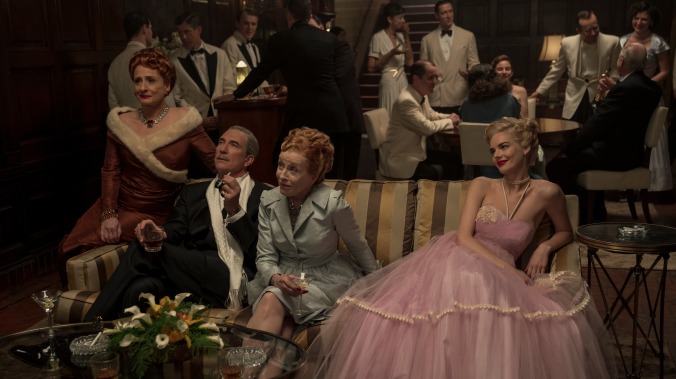Ryan Murphy’s imperfect Hollywood paints an inclusive picture of what could have been


“Could one movie change the way a nation sees itself?” That’s how a newsreel announcer gleefully boils down Hollywood’s fan-fictional premise, only to answer it in a way completely fitting for the show: “Who knows!” The limited series created by Ryan Murphy and Ian Brennan tracks the production of a potentially world-altering film at Ace Studios during the industry’s post-WWII Golden Age. Over seven brisk episodes, the series follows the ups and downs of both the movie and those involved in its creation. Hollywood’s optimistic ambitions and hit-and-miss realizations aside, it mostly functions as a bounty for backlot busybodies, with enough meat-and-potatoes procedure to keep things from drifting off into dreamland.
Murphy and Brennan’s second collaboration for Netflix (after The Politician), Hollywood is a story of outsiders bound together by the tale of a real-life Hollywood martyr: Peg Entwistle, who jumped to her death off the Hollywood sign’s H. Oddly enough, in a series focused on the female, queer, and POC communities during this era, Hollywood brings us in through Jack (David Corenswet), a square-headed, milk-drinking bundle of straight white mediocrity who’s utterly believable as a bad aspiring actor. These thematic ironies pop up throughout, coloring a show less than adept at handling its own complexities.
Driven by financial need, Jack quickly falls into the periphery of the acceptable Hollywood career path and gets a salty “deviant” break of his own. He falls into sex work for manipulative gas pump pimp Ernie (Dylan McDermott, in silver fox mode), inspired by the late Scotty Bowers, who caters to industry bigwigs of every sexual flavor. The quote from the 1924 film The Casting Couch—“The only way to become a star is to get under a good director and work your way up”—is taken to heart, but with an overtly positive twist.
Sex drives everything in this extreme version of the industry: Hopefuls are bought and sold because they’re all desperate—not just for money, but for validation and appreciation. Even sex between otherwise loving couples becomes transactional in the business. From this cynical and exploitative vantage, Hollywood pushes the halcyon dream of uncomplicated sex work… after Ernie tries to bully husband and expectant father Jack into being gay for pay, that is. But otherwise, Hollywood ponders how great it would be if industry dreams could come true by sleeping with the right lonely woman.
When Murphy and crew aren’t Billy Wildering out with this Sunset Boulevard rewrite, this strange reupholstering of the casting couch is somewhat balanced by the plight of Rock Hudson (Jake Picking), the other capital-H Hunk that Hollywood introduces. Another farm-bred meatball ready to be used and abused by the system, Hudson’s queerness is front-and-center from the jump. Picking, who looks more like Superman than a cartoon, does a fine job, even with a character written to be so stupid that he dives past ingénue into Big Dumb Henchman territory. He attracts abusive agent Henry Willson (Jim Parsons)—whose profane diatribes are as on-the-nose as Parsons’ ultra-slick delivery (“Actors are pieces of meat!”)—and sells himself for the dream of success.
Through a series of odd jobs, whack jobs, and blowjobs, the Peg Entwistle movie (Peg) gets greenlit. This ambitious project requires no small ensemble. For example, there’s gas station regular Avis (Patti LuPone), her studio head husband (Rob Reiner), and their aspiring actress daughter (Samara Weaving), who fits right into the Murphy-verse’s canon of icy, sharp, sneering blondes.
Actress Camille (Laura Harrier) and her director boyfriend, Raymond (Darren Criss) provide race-focused storylines. Camille is Black, beautiful, and miles more talented than every other actress around. Raymond, like Criss, is half Filipino; a running theme about his ability to pass for white becomes an epithet spit in his face. Black and gay screenwriter Archie (Jeremy Pope) just had his first sale. Pope, a Broadway actor in his first big screen role, is the show’s absolute breakout; he gets the best material by far and shines so brightly in every scene it’s hard to even see the others.
Studio executive power duo Dick (Joe Mantello) and Ellen (Holland Taylor) sell spelled-out dialogue and semi-logical arcs, finding poignancy and power in and beyond their identities—and that’s on top of actually making the movie. As silly as the series’ exaggerated plotting can be—and it definitely takes a bit to tie all its odds and ends together (the components that, in Hollywood’s vernacular, would make it a “message picture”)—everything eventually coalesces during production.
The episodes zip by and the story is exciting, even if you’re not an insider. If you are a fan—perhaps wooed by Feud or Hail, Caesar! (Hollywood contains a far inferior version of the “Would that it were so simple” scene)—expect plenty of history and rumor. Made by devotees of the era, Hollywood loves that silly historical fiction thing where characters address each other by their full names, like that’s a totally normal thing to do: “Why yes, Rory Calhoun, you are my client!” DP Simon Dennis (Pose, The Politician) stuffs the material’s lofty ambitions with lush colors and fourth-wall fun, drenching everything in Technicolor nostalgia somewhere between Mad Men and La La Land. The period costumes are striking on their own, but the show always looks better when someone’s taking them off. During these scenes, every camera move unfurls like a cartoon wolf’s tongue, each frame catering very generously to the gay male gaze. At one point, we’re literally swimming in dicks.
That queer soirée, the kind sadly best known now because of scandals surrounding Bryan Singer’s infamous pool parties, is Hollywood at its most engaging and disappointing. It dives headfirst into the moral gray where taboo and power conspire to create an environment operating as both safe haven and hunting ground. While the show attempts this complexity again during the life cycle of Peg, most obviously with Henry’s arc, it never reaches this insightful and dramatic peak. Peg becomes a rallying voice that stands up to every piece of hate disguised as conventional wisdom, having a road-to-Damascus moment where Hollywood’s broken system (and thus, America’s broken system) is fixed, top to bottom, by tops and bottoms. It’s the alt-history equivalent of thinking of the perfect comeback in the shower—the one that you should’ve said—for all of bigotry. Acclimated to the melodrama, it doesn’t even seem that far-fetched.
Ultimately, Hollywood’s message is clear, even if its messaging is muddled. The series is engrossing throughout and its optimism is undeniably winning. In fact, thanks to some perfect juxtapositions in the imperfect finale, it’s quite moving. And who couldn’t use a Hollywood ending-style pick-me-up right now?